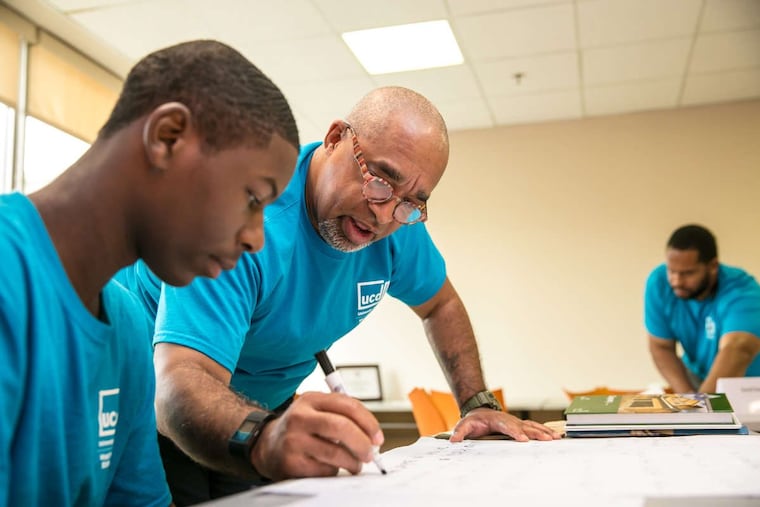6 inspiring city innovations from around the world - including one from Philly
The West Philadelphia Skills Initiative is a pioneering employer-based approach to workforce development works directly with institutional anchors in West Philadelphia such as Penn, CHOP, Drexel and other University City employers to tailor a job-training program that prepares local residents for high turnover jobs.

The 21st century is destined to be the century of the city.
During the last decade, the percentage of the world's population living in urban areas topped the 50 percent mark for the first time, with more than 80 percent of Americans living in metropolitan areas. At the same time, Philadelphia's population increased for the first time in over 60 years; adding more than 79,000 residents since 2006.
Developing innovative strategies to ensure that our cities thrive equitably is one of the great challenges of our age. Solving thorny urban problems such as affordable housing, the scourge of the opioid crisis, and managing growth in an era of constrained resources are not easy fixes.
At Drexel, we asked the question: "What skills does the 21st century urbanist need to tackle these challenges?" In response, the Lindy Institute for Urban Innovation, in conjunction with Westphal College of Media Arts and Design, launched its Master of Science in Urban Strategy (MSUS) graduate program last fall. Designed as the first multidisciplinary urban problem-solving program in the country, the MSUS program is training the next generation of urban leaders charged with solving social, environmental, and economic problems in an increasingly complex, dynamic, and interconnected world.
Here are some intriguing urban strategies that we are following:
» READ MORE: Quayside
Sidewalk Labs, a subsidiary of Alphabet (the parent company of Google), is developing the city of the future on 12 acres of Toronto's waterfront. The project, a partnership with Waterfront Toronto, aims to create high-performing "people-centered neighborhoods." With emphasis on the marriage of urban design and digital technology incorporating such Buck Rogers-esque conveniences as sensors that separate waste and recycling and self-driving transit, the project has nonetheless raised some cautionary voices who fear that Big Data raises the specter of Big Brother. Quayside is worth watching as it joins the list of emerging smart city projects from the Hudson Yards development in Manhattan to the South Korean city of Songdo.
» READ MORE: RIZE Massachusetts
Massachusetts leads the nation in opioid-related ER trips. RIZE Massachusetts was founded in 2017 to raise $50 million for treatment and prevention efforts statewide. A powerhouse consortium of business, philanthropy, academia, community leaders, and public health professionals is working to attack the crisis by raising and distributing funds intended to "test innovative approaches to opioid addiction recovery." With the country reeling from the impact of the opioid crisis, the Massachusetts example could be a holistic public health model that other states and municipalities might employ.
» READ MORE: OpenStreetMap Niger
A cadre of smartphone-armed adolescents and young adults are mapping flood zones in Sub-Saharan Niger's capital city of Niamey. With funding from the World Bank and the use of the free-Wiki mapping platform OpenStreetMap, these intrepid young researchers are wading through rice fields and helping farmers and residents better plan for natural disasters, while connecting their work to an early-warning system set up by Catholic Relief Services aimed at preventing flooding and minimizing damage. This act of resilient gumption demonstrates the power of smartphone technology to connect some of the world's most challenged areas with state-of-the-art data and resources. Imagine if the Jersey Shore had benefited from these smart-tech warriors before Sandy hit, raising the question of how a country with our embarrassment of resources might deploy technology and sweat equity to more emphatically address our social and economic challenges.
» READ MORE: 3-D-printed Smart Homes
Can the structural components for a whole house – and a smart house that is off the grid, no less, produced in eight hours? A Ukrainian start-up uses 3-D-printing robots to fabricate all of the walls, roofing, and flooring for a tiny house (410-sf minimum) that can then be assembled by others including windows, doors, and electrical and plumbing systems in 24 hours. Think of how these houses — autonomous when assembled — might be used to address the country's affordable-housing crisis or house the homeless or shelter refugees. And most recently, what if these houses were on site after the recent tragic wildfires and mudslides in California to rapidly get people back into dignified housing?
» READ MORE: New City Church, Minneapolis
Gentrification carries with it the stigma and stain of the urban revitalization era of the post-WWII years in this country where whole communities — predominantly low income and minority — were vaporized through the use of eminent domain in the name of progress. And yet, gentrification as part of the economic life cycle of cities is a phenomenon that can be traced back to Roman times. For 21st century Americans, our challenge is to manage change equitably. As a bulwark against gentrification, New City Church in Minneapolis works to keep people in their homes through revenue-producing programs in urban agriculture, cooperative housing, and progressive policy advocacy. Combining economics with social justice, New City Church could be a model for other communities across the country facing similar challenges.
» READ MORE: West Philadelphia Skills Initiative
An Initiative of the University City District, this pioneering employer-based approach to workforce development works directly with institutional anchors in West Philadelphia such as Penn, CHOP, Drexel University, and other University City employers to tailor a job-training program that prepares local residents for high-turnover jobs. By addressing local employment needs at both the supply and the demand sides, the West Philadelphia Skills Initiative is a model that might be scaled up throughout the city and across the country.
Harris Steinberg is executive director of the Lindy Institute for Urban Innovation, Distinguished Teaching Professor of Architecture and Interiors.